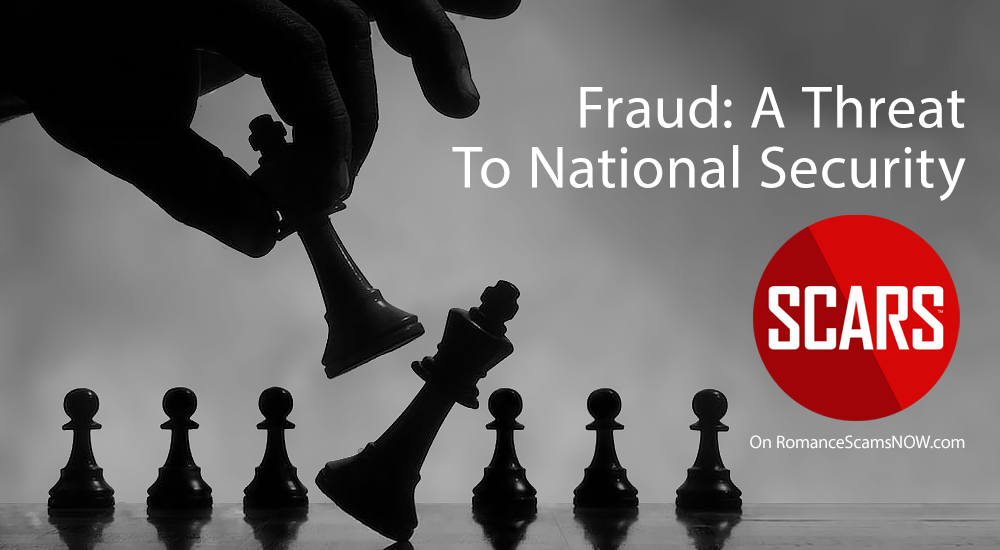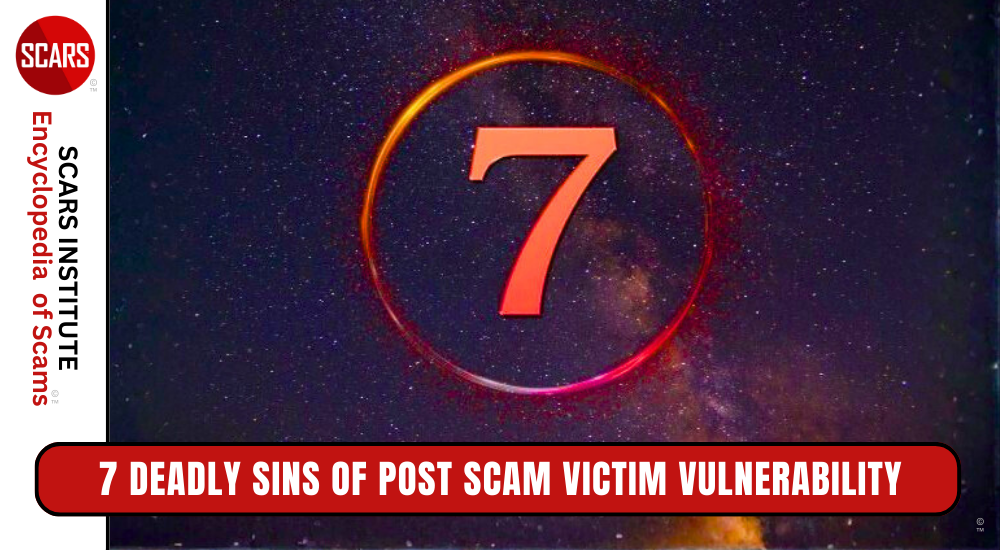
SCARS Institute’s Encyclopedia of Scams™ Published Continuously for 25 Years

The United Kingdom Has Already Accepted This, But Now The United States Is Feeling It Too!
Fraud Set To Be Upgraded As A Threat To National Security
The United States Government and the UK Government plan will see the crime reclassified and treated as seriously as terrorism and civil emergencies
Fraud is to be reclassified as a threat to national security under the UK government plans that will force police chiefs to devote more officers to solving the crime. We also need to see that realization find a home in the United States!
Fraud Should Be Upgraded As A Threat To National Security
Fraud is to be reclassified as a threat to national security as part of government plans to force police chiefs to deploy more officers to solve crimes.
It will be given the same status as terrorism, with chiefs & sheriffs tasked with increasing resources and pooling capabilities to fight a fraud epidemic that now accounts for 30 percent of all crime in the United States (but is likely more since so few victims report these crimes.)
It will be added to the Strategic Police Requirement, meaning ministers will require the armed forces to treat fraud as a top priority alongside terrorism, but also public disorder, civil emergencies, serious and organized crime, cyber-attacks, and child sexual abuse.
The move comes as the government prepares to unveil its new scam strategy this month after police were heavily criticized for ignoring their impact on victims.
Calls For A Quicker And Better Response
Only one in 1,000 crimes is solved, and with police departments deploying so few officers to investigate these crimes it is little doubt why these crimes are exploding.
SCARS estimates that approximately 50% of these cases can lead to a positive outcome for their victims. Either through sitting down a money mule, recovering money or cryptocurrency, and re-establishing trust in their communities.
In The UK
The task of overhauling the police response has been given to Chief Superintendent Nik Adams, the commander who coordinates white-collar and cybercrime at the City of London Police, the leading fraud force in England and Wales.
In an interview with The Telegraph, he highlighted the devastating impact of the crime, citing data showing fraud puts the lives of at least 300 people at risk each year. That means that according to them, one person may be committing suicide a day in the UK. But always remember that government never has real numbers, just the 1 to 3% that report.
“That’s a frightening number,” he said. “Data from 300 people a year is urgently being passed to their local police force to initiate some sort of equivalent to a 999 security response because someone is at such a critical point that they are at potential risk of suicide and self-harm as a result of this crime.”
Revision Of The UK’s Action Fraud
A key part of the overhaul in the UK will be an overhaul of Action Fraud, the much-criticized agency housed within the City of London Police. Ministers and police chiefs are still debating whether her reputation is so bad that she needs to be renamed.
Ch. Supt Adams acknowledged that current technology “isn’t doing what we want” as too much intelligence analysis of complex scams is still done manually and takes longer than officials wanted.
As part of a £30million government injection, a new artificial intelligence computer system is being built to act as the ‘mastermind’ to analyze and ‘stitch together’ all scams in the UK to identify the criminals behind them. It should be on the market next year.
Ch. Supt Adams said: “Huge investments are being made in a new action cheating system to take over calls and crime on board. A huge investment in the analytical skills behind it and a huge investment in the victim support service that has now been built up over several years.”
He said scams are now so sophisticated and global that, for example, a victim may think they’re being tricked by a US soldier when in fact they’re a Ghana-based criminal.
“We hope that technology will be better at scraping through all this digital information to connect the dots, recognize patterns and therefore prioritize certain investigations in a more streamlined and effective way in the future,” he said.
“White-collar Crime Teams” Set Up & Focus On The UK
All fraud cases are reported to UK’s Action Fraud or its rebranded version, which helps determine if it is large and serious enough for investigations to be directed by the National Crime Agency, newly reinforced regional police teams, or local forces.
Ten regional fraud squads, so-called “economic crime teams”, were set up with 96 of the 118 officers recruited so far. They replicate the structure of the 10 regional organized crime units.
“We will be managing the most serious and complex cases at the regional level, while also doing all of this work to support local police white-collar crime teams to ensure they are equipped and able to conduct local investigations,” said Ch Support Adams.
He said that even with the current system, 90 percent of all fraud investigations are completed within two years, cutting the time victims have had to wait for justice from “five, seven, 10 years.”
Ch Supt Adams said improved banking technology has now caught 65 percent of unauthorized payment scams, but this has led to an “exponential” rise in more sophisticated grooming scams.
Criminals collected personal data over weeks or months, which gave them the “apparent legitimacy” to sneak into people’s lives.
“Our efforts must be to dismantle these types of elaborate operations and invest immense sums in the types of campaigns to raise victims’ awareness of how this manipulation might manifest itself,” he said.
Criminals Diversify Into Fraud
Ch. Supt Adams added that criminals are increasingly turning to fraud due to the higher risks posed by traditional crimes such as burglary.
“Now, as a criminal, why would you go out at four in the morning and try to break into someone’s house while they’re sleeping, with all the forensic risks and opportunities and the minimal gain you get from a single crime?
“Why would you engage in this type of activity when you can go to a web platform and buy a tool that will send hundreds of phishing text messages to people?
“You just need a few people responding to this technology through this technology to give you an opportunity to make a significant amount of money.”
According To The Atlantic Council:
From bank fraud to malware to romance scams, cybercrime is everywhere. The Federal Bureau of Investigation’s 2021 Internet Crime Report cited $7 billion in cybercrime-related losses, double the losses reported in 2019. The totality of these losses has a major impact on the US economy, in addition to the lives of affected individuals and businesses that may watch their bank accounts drained and confidential information stolen.
But cybercrime is far from a purely economic problem; real national security concerns are wrapped up in the issue as well. Just as cybercriminals learn from each other, state hacking groups learn from cybercriminals, and vice versa. Cybercriminal infrastructure and even cybercriminals themselves have been coopted by governments in the past, and there is evidence of states potentially acquiring tooling from the cybercriminal underground.
Cybercrime is, of course, not a uniquely US problem. Like with all forms of crime, cybercriminals seek to connect with and learn from each other. Criminal forums, marketplaces, group chats, and even Facebook pages are watering holes for this underground economy, allowing threat actors to adapt techniques to their unique environments and targeting all around the world. British fraudsters have targeted customers’ sensitive personal information online in order to commit tax fraud. Brazilian malware developers have manipulated electronic invoices issued in the country to their names. Financially-motivated threat actors have targeted Australian superannuation accounts.
Learn more about this: https://www.atlanticcouncil.org/commentary/the-5×5-cybercrime-and-national-security/
The New Direction
According to think tank researchers and experts:
“To understand how cybercrime impacts national security, it is important to have a proper understanding of the motivations of cybercriminals and adversaries alike. There also may be substantial overlap with the tactics, techniques, and procedures (TTPs) employed by various threat actors, regardless of motivation. Cybercrime is often financially motivated. However, the same threat actors that are monetizing initial access to a network may also be selling that access to a state-sponsored adversary, whether they know it or not. State-sponsored adversaries may be employing proxies to deflect attribution attempts, thereby providing plausible deniability. The same TTPs that are often associated with less sophisticated cybercrime—social engineering, credential stealing malware, brute-forcing or credential stuffing—are also effective in state-sponsored attacks that can have a larger impact on national security.”
“Cybercrime impacts national security in different ways, including by offering a fertile ground for organized crime and hostile nation states to obtain and launder illicit profits; threatening the economic stability of households, enterprises and governments; and, in some cases, disrupting supply chains and leaving critical sectors paralyzed. The paradigm shift ‘from online criminal activity to national security threat’ was bolstered by the recent ransomware attacks against Colonial Pipeline and Kaseya that prompted the classification of ransomware as a national security matter. The nationwide Conti ransomware attacks against Costa Rica’s public and private sector, and the country’s subsequent state of emergency declaration, is another clear example.”
“For over forty years, cybercrime has presented the risk of unauthorized access to national security information and associated information systems. Today, this risk is heightened by the growth of highly profitable transnational cybercriminal networks. These transnational criminal networks have both conducted and enabled highly disruptive cyber incidents that have impacted the operation of critical infrastructure and essential services. These criminal networks may serve as proxies for malicious foreign government activities or provide a degree of plausible deniability to foreign government security services for their own malicious cyber activities.”
“Cybercrime is borderless, and combatting it requires the widest level of international cooperation possible, encompassing stakeholders from government, law enforcement, and the private sector. As an example of this, most successful law enforcement counter-cybercrime operations have benefitted from internationally-coordinated frameworks, while many private sector companies have acquired a leading role in disrupting and providing investigative support to the public sector.”
“The types of ways to steal someone’s identity have changed significantly over the last few years. Whereas username and password may have once been sufficient to gain access to an individual’s account and personal information, increased user awareness, multi-factor authentication, and cybersecurity have mitigated these types of attacks. The introduction of log shops that sell browser fingerprints, new methods of bypassing multi-factor authentication—like social engineering, SIM swapping, and more automated bypass methods like OTP bots, for example—all demonstrate the evolution of identity fraud that could result in account takeover.”
“Synthetic Identity Fraud (SIF). This crime involves leveraging legitimate personally identifiable information (PII) to create a false identity that can be used for several malicious purposes, including establishing lines of credit or committing financial fraud. During the COVID-19 pandemic, threat actors would leverage stolen PII to take advantage of the US government relief programs, like the CARES Act. Some agencies estimate that over $100 billion in taxpayer money was stolen by fraudsters stealing or creating fake identities to claim unemployment benefits from state workforce agencies.
But Is There A Solution?
“The United States and its allies can encourage cooperation by enabling more public-private collaboration and incorporating industry expertise in task forces and initiatives.”
“The relationship between international cybercrime, state-sponsored threat actors, and a burgeoning effort to establish coordinated and like-minded initiatives to thwart cybercrime, is quite complicated. However, existing international treaties like the Budapest Convention on Cybercrime, aims to establish a cooperative framework to combat cyber threats, and non-binding efforts like the Tallinn Manual, actively aim to address international legal issues when operating in cyberspace. Russia, meanwhile, has pushed back on the Budapest Convention and proposed its own Cybercrime Treaty to the United Nations (UN Resolution 74/247), broadening the definition of cybercrime and scope of their authority. Suffice it to say, it is extremely important for the United States and its allies to establish a firm understanding of the threat landscape and its shared security goals.”
A Clear Understanding
SCARS likewise believe that the answer is a clear recognition of the vast scope of these crimes and the seriousness of their nature to harm us all!
“Fraud, in its various forms, poses a significant threat to the national security of the United States. Fraud is not just a financial crime, but it undermines the foundations of trust and confidence that are essential to a functioning society. Fraudsters, who often operate across borders and use technology to conceal their activities, can cause harm on a massive scale and destabilize both the domestic and international financial systems.” – Tim McGuinness, Ph.D., DFin, MCPO, MAnth, SCARS Director
The primary reasons why fraud should be treated as a threat to national security are its potential impact on the economy, critical infrastructure, and the safety and security of individuals. Fraud can cause financial harm to both individuals and businesses, which can have ripple effects throughout the economy. This is especially true in the case of large-scale fraud, such as investment scams, Ponzi schemes, relationship scams, and corporate fraud, which can cause significant losses to individuals and investors and disrupt the stability of the financial system.
Fraud also poses a threat to critical infrastructure, such as power grids, telecommunications networks, and other vital systems. Fraudsters who target these systems can cause significant harm and disrupt essential services, putting lives and property at risk. As an example, fraudsters who gain access to sensitive information, such as usernames and passwords, can use this information to disrupt the operations of critical infrastructure. In addition, fraudsters can use the proceeds of their crimes to fund other malicious activities, such as terrorism, that pose a threat to national security.
Another reason why fraud should be treated as a threat to national security is because of the harm it can cause to individuals. Fraudsters often target vulnerable populations, such as the elderly and those with limited financial resources, which may be less able to detect and respond to fraudulent activities. The psychological and financial impact of fraud can be devastating to victims and their families, causing long-term harm to their well-being and financial stability.
Furthermore, the rise of digital and online technologies has enabled fraudsters to operate more effectively and at a larger scale than ever before. Fraudsters can now use the internet to reach large numbers of potential victims, conceal their identities, and automate many of their activities. This makes it harder for law enforcement and financial institutions to detect and prevent fraud and increases the risk of harm to individuals and businesses.
In light of these challenges, it is clear that fraud must be treated as a national security threat. This requires a coordinated effort between law enforcement, financial institutions, and the private sector to detect and prevent fraud and to protect the public from its harmful effects. This effort should include increased investments in technology and resources to strengthen the ability of law enforcement and financial institutions to detect and prevent fraud. It should also include increased public education and outreach efforts to raise awareness of the threat of fraud and to help individuals and businesses better protect themselves from its harmful effects.
Fraud is a serious threat to national security in the United States, and it is essential that all stakeholders take action to address this challenge. By working together, the government, law enforcement, financial institutions, and the private sector can help protect the public from the harmful effects of fraud and maintain the stability and security of the economy and critical infrastructure. By treating fraud as a national security threat, we can help ensure a safer, more secure, and more prosperous future for all Americans.
-/ 30 /-
What do you think about this?
Please share your thoughts in a comment below!
Table of Contents
LEAVE A COMMENT?
Recent Comments
On Other Articles
- SCARS Institute Editorial Team on Reporting Scams & Interacting With The Police – A Scam Victim’s Checklist [VIDEO]: “Yes, this is a scam. For your own sanity, just block them completely.” Feb 25, 15:37
- on Danielle Delaunay/Danielle Genevieve – Stolen Identity/Stolen Photos – Impersonation Victim UPDATED 2024: “She goes by the name of Sanrda John now” Feb 25, 10:26
- on Reporting Scams & Interacting With The Police – A Scam Victim’s Checklist [VIDEO]: “So far I have not been scam out of any money because I was aware not to give the money…” Feb 25, 07:46
- on Love Bombing And How Romance Scam Victims Are Forced To Feel: “I was love bombed to the point that I would do just about anything for the scammer(s). I was told…” Feb 11, 14:24
- on Dani Daniels (Kira Lee Orsag): Another Scammer’s Favorite: “You provide a valuable service! I wish more people knew about it!” Feb 10, 15:05
- on Danielle Delaunay/Danielle Genevieve – Stolen Identity/Stolen Photos – Impersonation Victim UPDATED 2024: “We highly recommend that you simply turn away form the scam and scammers, and focus on the development of a…” Feb 4, 19:47
- on The Art Of Deception: The Fundamental Principals Of Successful Deceptions – 2024: “I experienced many of the deceptive tactics that romance scammers use. I was told various stories of hardship and why…” Feb 4, 15:27
- on Danielle Delaunay/Danielle Genevieve – Stolen Identity/Stolen Photos – Impersonation Victim UPDATED 2024: “Yes, I’m in that exact situation also. “Danielle” has seriously scammed me for 3 years now. “She” (he) doesn’t know…” Feb 4, 14:58
- on An Essay on Justice and Money Recovery – 2026: “you are so right I accidentally clicked on online justice I signed an agreement for 12k upfront but cd only…” Feb 3, 08:16
- on The SCARS Institute Top 50 Celebrity Impersonation Scams – 2025: “Quora has had visits from scammers pretending to be Keanu Reeves and Paul McCartney in 2025 and 2026.” Jan 27, 17:45
ARTICLE META
Important Information for New Scam Victims
- Please visit www.ScamVictimsSupport.org – a SCARS Website for New Scam Victims & Sextortion Victims
- Enroll in FREE SCARS Scam Survivor’s School now at www.SCARSeducation.org
- Please visit www.ScamPsychology.org – to more fully understand the psychological concepts involved in scams and scam victim recovery
If you are looking for local trauma counselors please visit counseling.AgainstScams.org or join SCARS for our counseling/therapy benefit: membership.AgainstScams.org
If you need to speak with someone now, you can dial 988 or find phone numbers for crisis hotlines all around the world here: www.opencounseling.com/suicide-hotlines
A Note About Labeling!
We often use the term ‘scam victim’ in our articles, but this is a convenience to help those searching for information in search engines like Google. It is just a convenience and has no deeper meaning. If you have come through such an experience, YOU are a Survivor! It was not your fault. You are not alone! Axios!
A Question of Trust
At the SCARS Institute, we invite you to do your own research on the topics we speak about and publish, Our team investigates the subject being discussed, especially when it comes to understanding the scam victims-survivors experience. You can do Google searches but in many cases, you will have to wade through scientific papers and studies. However, remember that biases and perspectives matter and influence the outcome. Regardless, we encourage you to explore these topics as thoroughly as you can for your own awareness.
Statement About Victim Blaming
SCARS Institute articles examine different aspects of the scam victim experience, as well as those who may have been secondary victims. This work focuses on understanding victimization through the science of victimology, including common psychological and behavioral responses. The purpose is to help victims and survivors understand why these crimes occurred, reduce shame and self-blame, strengthen recovery programs and victim opportunities, and lower the risk of future victimization.
At times, these discussions may sound uncomfortable, overwhelming, or may be mistaken for blame. They are not. Scam victims are never blamed. Our goal is to explain the mechanisms of deception and the human responses that scammers exploit, and the processes that occur after the scam ends, so victims can better understand what happened to them and why it felt convincing at the time, and what the path looks like going forward.
Articles that address the psychology, neurology, physiology, and other characteristics of scams and the victim experience recognize that all people share cognitive and emotional traits that can be manipulated under the right conditions. These characteristics are not flaws. They are normal human functions that criminals deliberately exploit. Victims typically have little awareness of these mechanisms while a scam is unfolding and a very limited ability to control them. Awareness often comes only after the harm has occurred.
By explaining these processes, these articles help victims make sense of their experiences, understand common post-scam reactions, and identify ways to protect themselves moving forward. This knowledge supports recovery by replacing confusion and self-blame with clarity, context, and self-compassion.
Additional educational material on these topics is available at ScamPsychology.org – ScamsNOW.com and other SCARS Institute websites.
Psychology Disclaimer:
All articles about psychology and the human brain on this website are for information & education only
The information provided in this article is intended for educational and self-help purposes only and should not be construed as a substitute for professional therapy or counseling.
While any self-help techniques outlined herein may be beneficial for scam victims seeking to recover from their experience and move towards recovery, it is important to consult with a qualified mental health professional before initiating any course of action. Each individual’s experience and needs are unique, and what works for one person may not be suitable for another.
Additionally, any approach may not be appropriate for individuals with certain pre-existing mental health conditions or trauma histories. It is advisable to seek guidance from a licensed therapist or counselor who can provide personalized support, guidance, and treatment tailored to your specific needs.
If you are experiencing significant distress or emotional difficulties related to a scam or other traumatic event, please consult your doctor or mental health provider for appropriate care and support.
Also read our SCARS Institute Statement about Professional Care for Scam Victims – click here to go to our ScamsNOW.com website.
















Thank you for your comment. You may receive an email to follow up. We never share your data with marketers.